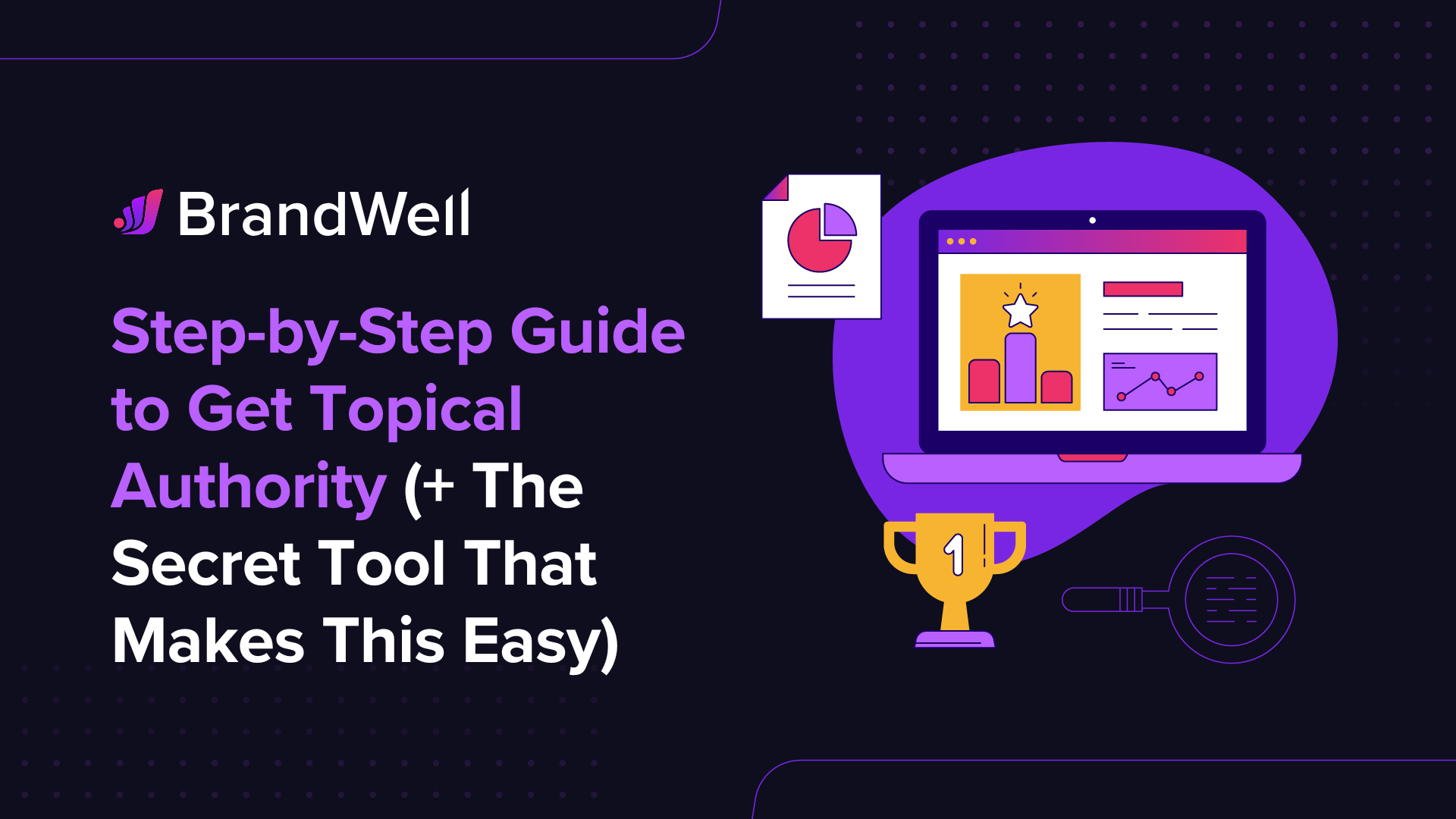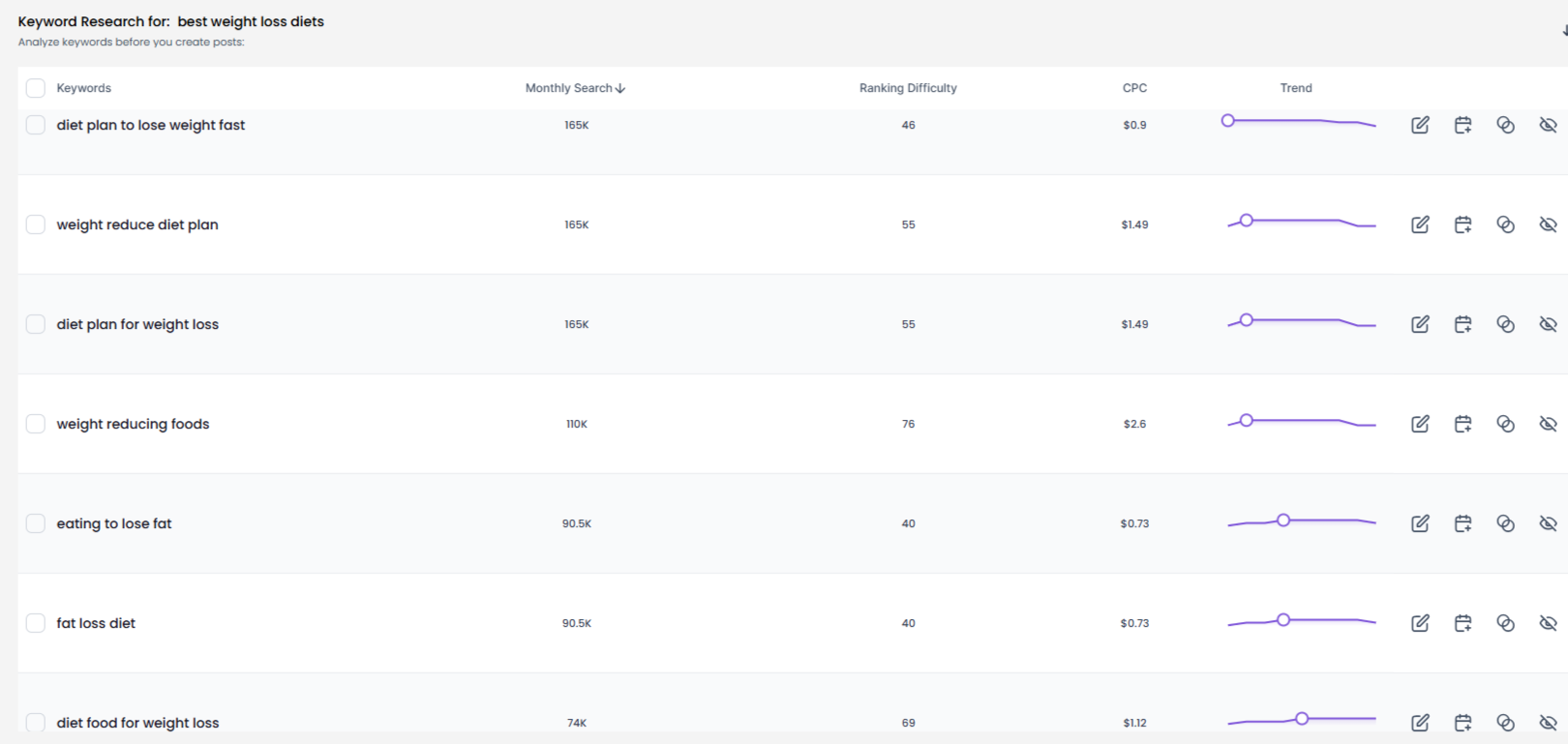Ever feel like Google just isn’t giving your site the recognition it deserves? You’re pumping out content, optimizing keywords, and maybe even building links — but your rankings are still nowhere near where you want them to be.
Here’s the thing: SEO isn’t just about individual keywords anymore. It’s about proving to search engines that you’re the expert in your niche.
That’s where topical authority comes in.
When you establish topical authority, Google starts seeing your site as the go-to resource for an entire subject, not just a handful of keywords.
The result? Better rankings, more organic traffic, and a stronger brand presence.
In this guide, I’ll explain exactly what topical authority is, why it matters, and how you can build it step by step.
Let’s dive in.
What is Topical Authority?
Topical authority is all about proving to both search engines and users that your site is the trusted expert on a particular subject.
Instead of just ranking for a few scattered keywords, you’re building a reputation as the go-to resource in your niche.
Think of it this way: If you wanted reliable health advice, you’d probably trust WebMD over a random blog with two articles about nutrition, right? That’s because WebMD has covered everything in-depth, signaling to both readers and Google that it knows its stuff.
The same applies to any niche.
If you’re blogging about weight loss, for example, writing a single article on “how to lose weight fast” won’t be enough to compete. You’d need to cover related topics like:
- The best diets for sustainable weight loss
- How many calories do you actually need to lose weight
- Strength training vs. cardio for fat loss
- Common weight loss mistakes that slow progress
- The science behind metabolism and weight loss
- How to break through weight loss plateaus
- The role of sleep and stress in weight loss
- Meal plans for weight loss (for different dietary needs)
- Intermittent fasting: Does it really work?
- The truth about weight loss supplements
- How to lose weight without losing muscle
- Emotional eating and how to overcome it
By covering a topic from every possible angle, you’re sending a strong signal to search engines: Hey, I’m not just writing about this — I know this inside and out.
Here Moz illustrates how to build topic clusters in the knitting niche:
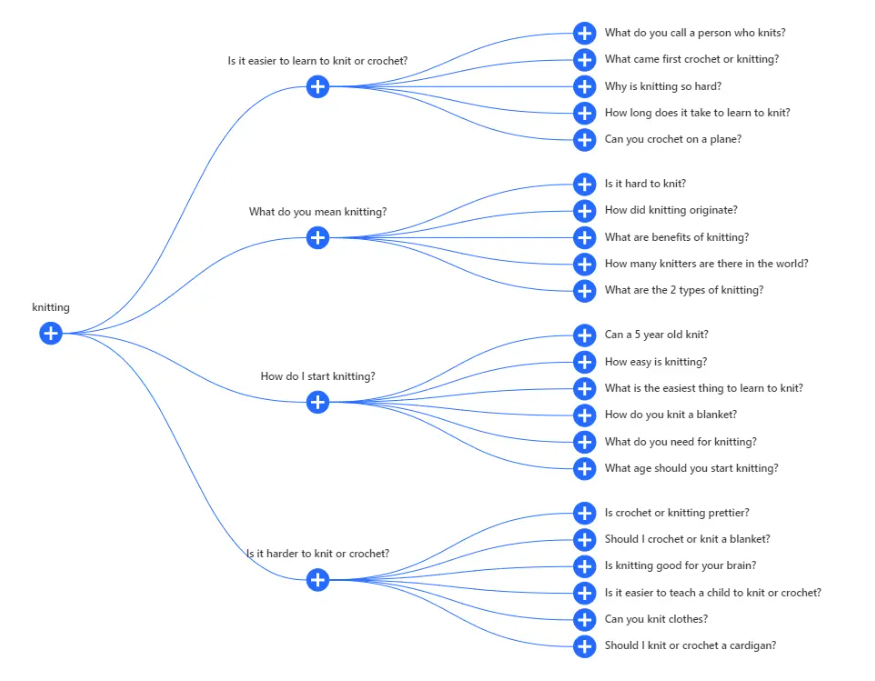
Why Should You Care About Topical Authority?
Because it’s the key to ranking higher, getting more traffic, and building trust with your audience.
When search engines recognize your site as a topical authority, they don’t just rank one of your articles — they start ranking multiple pages across your site for various related keywords.
That means more organic traffic, better visibility, and a stronger presence in your niche.
Google works with semantic associations, meaning it tries to understand the connections between topics and keywords. If your site covers a subject comprehensively, Google is more likely to see you as a trusted resource.
This also allows for:
- More relevant internal links – Interlinking your content helps search engines and users navigate your site more easily.
- Higher chances of earning backlinks – The more valuable and in-depth your content, the more likely others will link to it.
- Long-term SEO benefits – Instead of chasing short-term rankings for individual keywords, you’re building a solid foundation that keeps bringing in traffic over time.
At the end of the day, topical authority isn’t just about SEO — it’s about becoming the go-to source in your niche. And when that happens, both search engines and real people will take notice.
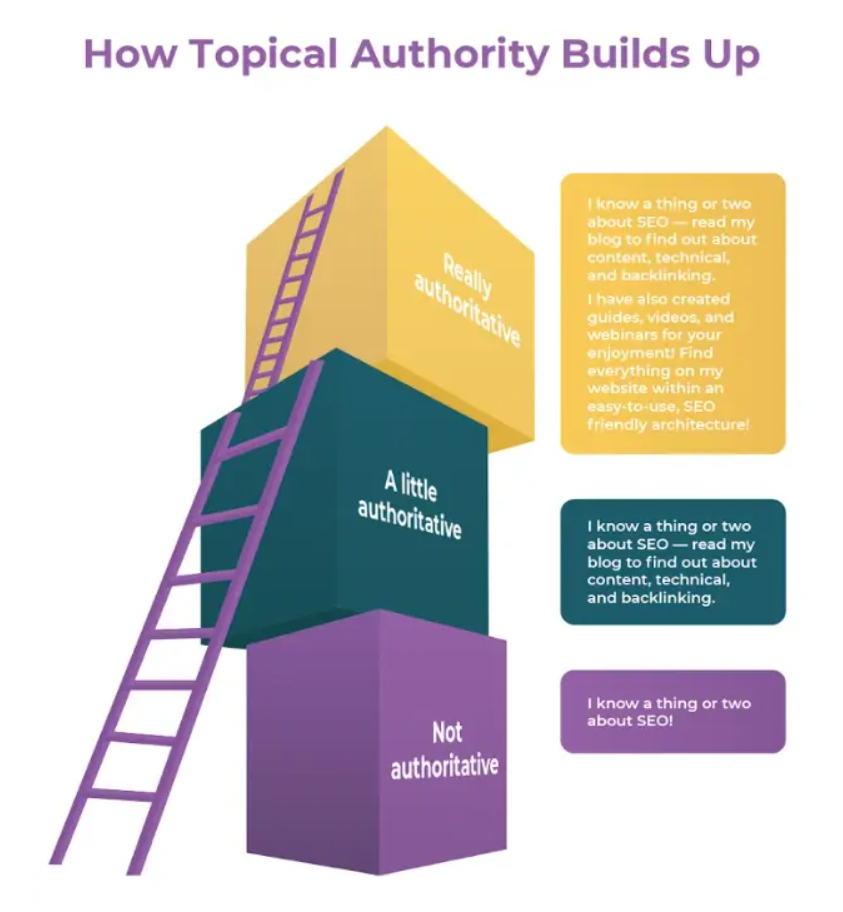
Screenshot from Moz
How to Build Topical Authority: Step by Step
Building topical authority isn’t just about writing a bunch of blog posts. It’s about strategically covering a subject so thoroughly that search engines (and readers) have to see you as the go-to expert.
Here’s how to do it in 7 steps.
Step 1: Choose a Strong Seed Keyword in Your Niche
The first step in building topical authority is picking the right seed keyword — a broad, foundational term that defines your niche.
This is the starting point for your content strategy, as it helps you map out related topics and build a structured content plan.
A good seed keyword should:
✔️Be broad enough to cover multiple subtopics (e.g., “weight loss” instead of “best weight loss exercises”)
✔️Be an entity in Google’s Knowledge Graph, meaning Google already recognizes it as an established topic
✔️ Have a steady search demand — not too niche, not too competitive
To find a good seed keyword, I use a combination of these three methods:
1. Google Autocomplete to Identify Popular Topics
Google Autocomplete suggests search queries based on what real users are typing. This is an easy way to find popular and relevant seed keywords in your niche.
How to use it:
- Go to Google and start typing a broad keyword (e.g., “weight loss”).
- Look at the autocomplete suggestions — Google is telling you what people are searching for!
- Test different variations by adding words like “best,” “guide,” or “tips” after your keyword.
For example, typing “weight loss for” gave me these suggestions:

These suggestions indicate topics that users are interested in, helping you refine your seed keyword.
2. ChatGPT for Topic Ideation
ChatGPT can also help generate seed keyword ideas by analyzing trends and user intent. You can ask for topic suggestions, niche breakdowns, and keyword clusters.
How to use it:
- Open ChatGPT (or another AI chatbot like Gemini or Claude).
- Use a prompt like: “What are some high-level topics in the weight loss niche?” or “Give me a list of popular subtopics related to weight loss.”
Here’s what ChatGPT came up with:
Diet & Nutrition
Best diets for weight loss (e.g., keto, intermittent fasting, Mediterranean)
Meal planning for weight loss
High-protein foods for fat loss
Healthy snacks for weight loss
How to reduce sugar intake
Hydration and weight lossExercise & Fitness
Best workouts for weight loss
Strength training vs. cardio for fat loss
HIIT workouts for burning calories
Walking vs. running for weight loss
Home workouts for weight loss
How to boost metabolism with exerciseWeight Loss Strategies & Tips
How to create a calorie deficit
Common weight loss mistakes to avoid
How to break through a weight loss plateau
Sustainable weight loss vs. quick fixes
How to stay motivated on a weight loss journey
The role of sleep in weight lossPsychology & Mindset
Emotional eating and how to overcome it
Building healthy habits for long-term weight loss
The role of self-discipline in weight management
How stress affects weight lossSupplements & Weight Loss Aids
Do fat burners work?
Best supplements for weight loss
The role of probiotics in weight loss
Apple cider vinegar and weight loss: Fact or myth?Medical & Scientific Perspectives
The science behind weight loss
The role of hormones in weight management
How gut health affects weight loss
Medical weight loss treatments (e.g., GLP-1 medications, weight loss surgery)
Review the generated suggestions and identify broad keywords that align with your expertise.
This helps you spot the main themes within your niche, making it easier to choose a strong seed keyword.
3. Google Trends to Check Search Popularity Over Time
Another favorite tool of mine is Google Trends which helps you analyze whether a keyword is gaining or losing popularity. You don’t want to choose a seed keyword that’s declining in interest.
How to use it:
- Visit Google Trends.
- Enter your potential seed keyword (e.g., “weight loss”).
- Set the time range to 5 years to see long-term trends.
- Compare multiple keywords to find the one with consistent or rising interest.
For example, if you compare:
- Weight loss (steady interest over time ✅)
- Juicing for weight loss (declining trend ❌)
- Ozempic for weight loss (spiking but might be temporary ⚠️)

You’ll see which topics have lasting relevance. Aim for a keyword that maintains steady interest rather than short-term trends that might fade.
Once you’ve found a strong seed keyword, the next step is expanding it into a full list of related keywords to build your content plan.
Step 2: Find Related Keywords Using Keyword Research Tools
Search engines like Google rank websites higher when they comprehensively cover a subject. If you only write one article on “weight loss,” you’ll struggle to compete with websites that cover everything from diet plans to workout routines, calorie counting, and metabolism hacks.
Let me show you three ways to find these subtopics you need to cover.
1. Find High-Value Keywords Using Keyword Research Tools
SEO tools like Ahrefs, Semrush, and Google Keyword Planner can help you discover keywords with high search volume and ranking potential.
How to use them:
- Enter your seed keyword (e.g., “weight loss”) into the Keyword Explorer tool.
- Look at the Related Keywords or Keyword Ideas section.
- Filter results based on:
🔹Search volume (how many people search for it per month)
🔹Keyword difficulty (how hard it is to rank)
🔹Search intent (informational, commercial, transactional)
Here are the results I got from the free Ahrefs Keyword Generator:
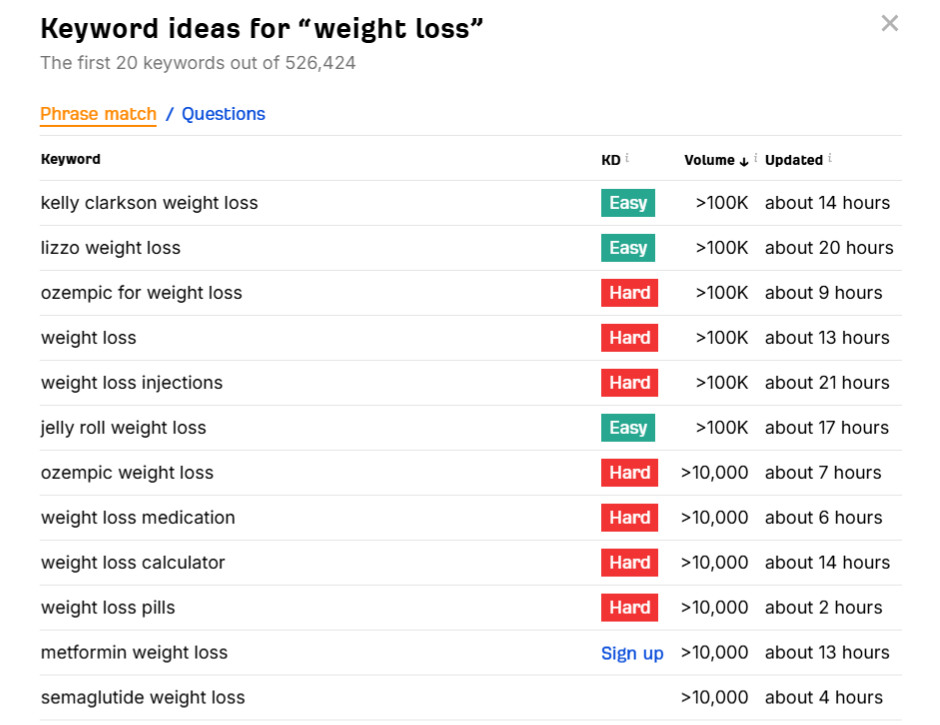 Bonus Tip: Look at the People Also Ask (PAA) section on Google for common questions related to your seed keyword. These are great for creating FAQ-style content that ranks in featured snippets.
Bonus Tip: Look at the People Also Ask (PAA) section on Google for common questions related to your seed keyword. These are great for creating FAQ-style content that ranks in featured snippets.
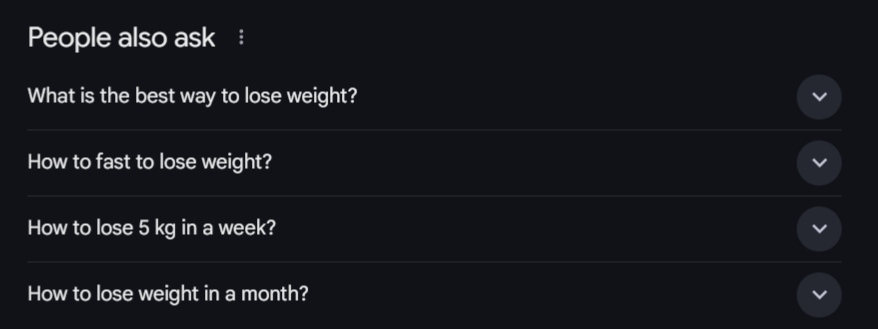
2. Analyze Competitor Content for Keyword Gaps
Another effective way to find keywords is by analyzing top-ranking competitors in your niche.
How to do this with Ahrefs or Semrush:
- Search for your seed keyword on Google.
- Copy the URLs of the top 3-5 ranking pages.
- Enter these URLs into Ahrefs’ Site Explorer or Semrush’s Organic Research tool.
- Look at the Keywords They Rank For but you don’t — these are your keyword gaps.
For example, if a competitor ranks for:
“how to lose belly fat in a week”
“weight loss meal plan for beginners”
“is walking good for weight loss”
And you haven’t covered these topics yet, they should go on your list!
3. Identify Long-Tail Keywords for Easier Rankings
Long-tail keywords are longer, more specific search queries that typically have lower competition but higher conversion potential.
For example, instead of just targeting “weight loss”, you could go after:
“weight loss tips for busy moms”
“best weight loss plan for men over 40”
“how to lose weight with PCOS”
These keywords often have lower search volume, but they attract highly targeted visitors who are more likely to engage with your content.
How to find long-tail keywords:
1. Use AnswerThePublic (a free tool that generates question-based keywords).
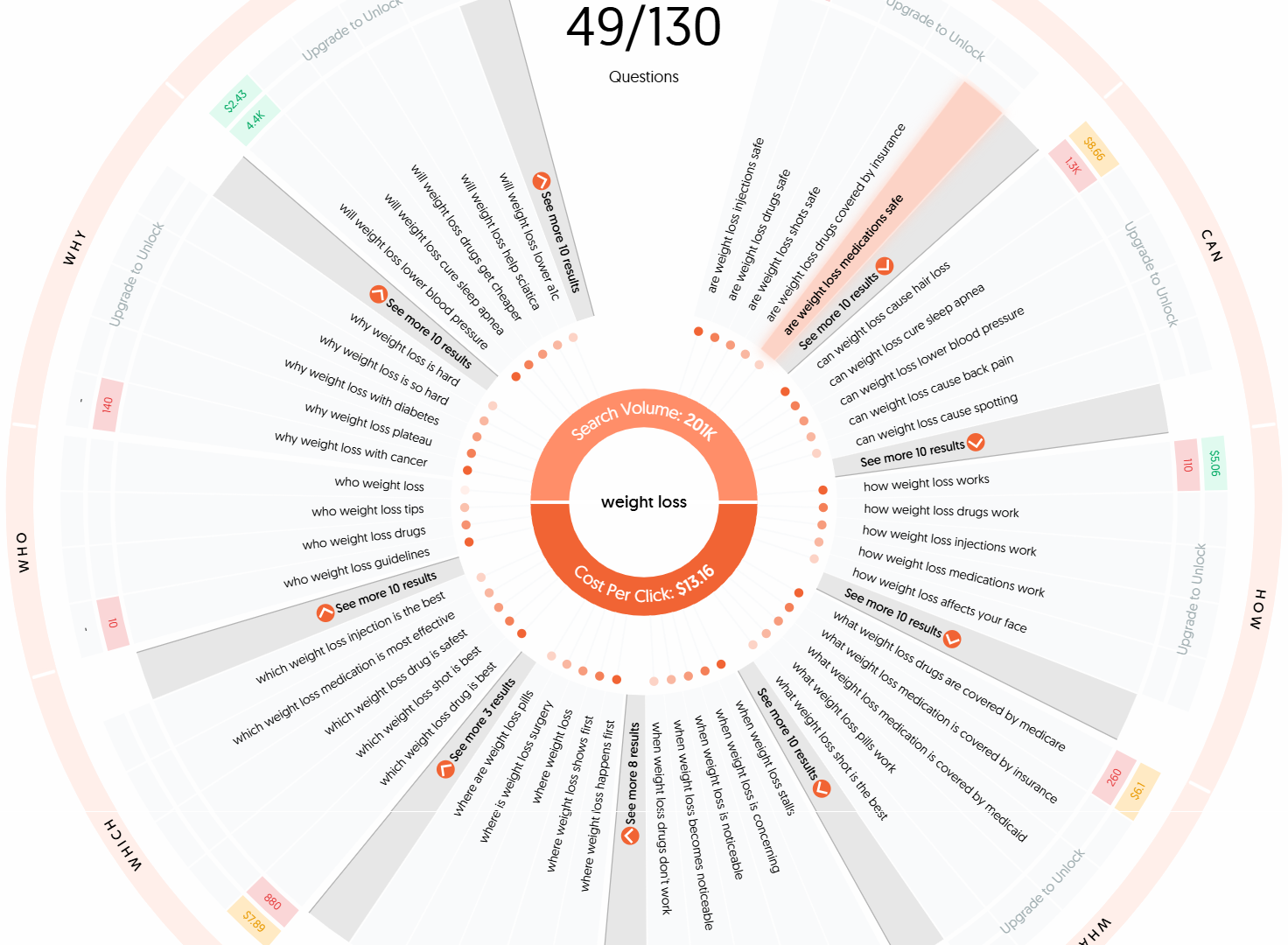
2. Check the “People also search for” section at the bottom of Google search results.
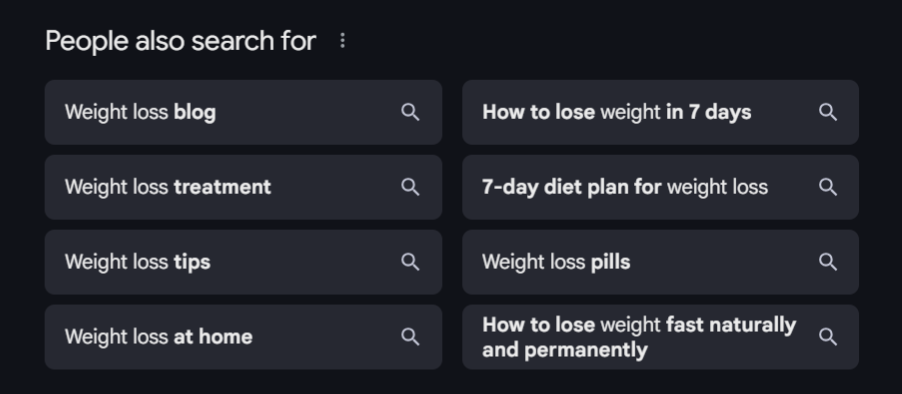
3. Look at Reddit and Quora to see what real people are asking.

Now that you have a solid list of related keywords, the next step is structuring them into a logical content framework. This is where content silos, pillar pages, and topic clusters come in.
Step 3: Build Content Silos Through Keyword Mapping
A content silo is a way of grouping related topics in a hierarchical structure, making it easier for search engines to understand your site’s expertise.
When done correctly, content silos:
✔️ Improve SEO rankings by reinforcing topical authority
✔️ Help users navigate your content more easily
✔️ Allow for strategic internal linking, boosting the visibility of key pages
How to Structure a Content Silo
A content silo follows a top-down structure, usually looking something like this:
1️⃣ Pillar Page (Broad Topic) → Covers a high-level topic and serves as the “hub”
2️⃣ Cluster Pages (Subtopics) → Cover related subtopics in-depth
3️⃣ Supporting Content (Long-tail Keywords, FAQs, Case Studies) → Answers specific user questions
For example, in the weight loss niche:
Your pillar page could be “The Ultimate Guide to Weight Loss”.
Cluster pages may include:
“Best Diets for Weight Loss”
“Effective Weight Loss Workouts”
“How to Lose Weight Without Exercise”
“Weight Loss for Women vs. Men: Key Differences”
Supporting content might be:
“How Many Calories Should You Eat to Lose Weight?”
“Does Intermittent Fasting Work for Weight Loss?”
“Walking vs. Running: Which is Better for Fat Loss?”
“Why Am I Not Losing Weight? Common Mistakes to Avoid”
Each cluster page links back to the pillar page, and all supporting content interlinks naturally.
Learn more about strategic linking between pieces of content within your website.
Mapping Keywords to Silos
Now that you have your silo structure, you need to assign keywords to each section.
How to do keyword mapping:
- Use a spreadsheet (Google Sheets, Excel, or Notion)
- Create columns for:
🔹Primary keyword
🔹Search volume
🔹Keyword difficulty
🔹Content type (pillar, cluster, supporting)
🔹URL structure (slug) - Group keywords based on intent (informational, commercial, transactional)
Example keyword mapping for a weight loss silo:

Why this works:
✔️ It ensures logical topic coverage
✔️ Google understands your site’s expertise
✔️ Internal linking between content strengthens SEO signals
Read this guide to learn how to do keyword mapping effectively.
Best Practices for Content Silos
1️⃣ Keep URLs clean & structured → Example:
/weight-loss-guide/ (pillar)
/weight-loss/exercise-tips/ (cluster)
/weight-loss/exercise-tips/best-home-workouts/ (supporting)
2️⃣ Use internal linking strategically → Always link from cluster pages back to the pillar page to consolidate authority.
3️⃣ Don’t mix unrelated topics → Keep each silo focused. If you cover “weight loss” and “muscle building,” separate them into different silos.
Now that your content silos are mapped, it’s time to start writing!
Step 4: Create Pillar Content — The Cornerstone of Your Topical Authority Strategy
Pillar content is a comprehensive, in-depth guide on a broad topic within your niche. It acts as the “hub” for all related cluster content and is designed to:
✔️ Cover the topic thoroughly so readers get all the essential information in one place
✔️ Rank for high-volume keywords and attract organic traffic
✔️ Encourage internal linking by connecting to related cluster pages
✔️ Position your website as an authority in the eyes of search engines
What Makes a Great Pillar Page?
A high-quality pillar page should:
✔️ Be long-form (3,000+ words): Covers all major aspects of the topic
✔️ Answer all key questions: Think of it as the “ultimate guide”
✔️ Be well-structured: Uses headers (H2s, H3s), bullet points, and visuals
✔️ Link to cluster pages: Each section introduces subtopics with links to dedicated articles
✔️ Be regularly updated: Freshness is key for SEO
For example, if your pillar topic is “The Ultimate Guide to Weight Loss”, your structure might look like this:
Title: The Ultimate Guide to Weight Loss: Everything You Need to Know
1️⃣ Introduction: What weight loss is, why it matters, and common myths
2️⃣ How Weight Loss Works: The science behind calorie deficits and metabolism
3️⃣ Popular Weight Loss Diets: Keto, Paleo, Mediterranean, Intermittent Fasting
4️⃣ Best Exercises for Weight Loss: Strength training, cardio, HIIT, yoga
5️⃣ Common Weight Loss Mistakes: Over-restriction, lack of protein, starvation, not enough sleep
6️⃣ How to Track Progress: Weight, body measurements, before-and-after photos
7️⃣ Frequently Asked Questions: Answer common user concerns
8️⃣ Conclusion: Encourage action with a powerful CTA
Each section briefly introduces a subtopic and links to dedicated cluster articles for more details.
How to Write Pillar Content That Ranks
1️⃣ Research Top-Ranking Pages
Before writing, analyze the top 3-5 ranking articles for your target keyword. Use:
- Google Search: Look at headlines and subtopics covered
- Ahrefs/Semrush: Check competitor content structure
- People Also Ask (PAA): Find common questions to include
2️⃣ Write a Strong Introduction
Your intro should hook the reader and make them want to keep reading. Try using:
- A question: “Struggling to lose weight despite trying everything?”
- A statistic: “Over 70% of adults try to lose weight every year, but most fail — here’s why.”
- A pain point: “Tired of endless dieting with no results? Let’s fix that.”
3️⃣ Use a Clear Structure with Jump Links
Long-form content can be overwhelming. Make navigation easier by:
- Using a table of contents with jump links
- Breaking up text with H2s, H3s, and bullet points
- Adding bold text & callout boxes for key takeaways
4️⃣ Link to Cluster Pages
Each major section should briefly summarize the topic and include a call-to-action link to a detailed cluster article.
Example:
Best Diets for Weight Loss
There are countless weight loss diets, but not all are effective. Popular ones include:
- Keto Diet → Focuses on high fat, low carbs
- Intermittent Fasting → Cycles between eating and fasting periods
- Mediterranean Diet → Prioritizes whole foods and healthy fats
Want to see which diet is right for you? Check out our in-depth guide: Best Diets for Weight Loss.
5️⃣ Optimize for SEO
- Add your primary keyword in the title & URL (e.g., /ultimate-weight-loss-guide/)
- Use secondary keywords naturally throughout the content
- Write a compelling meta title & description
- Add optimized images & alt text
- Use schema markup for better SERP visibility
Once your pillar page is live, the next step is creating topic clusters — detailed articles that expand on each subtopic and strengthen your authority.
Step 5: Create Topic Clusters
A topic cluster is a set of pages that revolve around a central pillar topic, each covering a specific subtopic in detail.
How to Create Topic Clusters
1️⃣ Identify Cluster Topics
Look at your keyword research & content silo map to determine subtopics. Good cluster topics:
✔️ Answer common questions about the pillar topic
✔️ Target long-tail keywords with lower competition
✔️ Provide deeper insights beyond the main guide
2️⃣ Write High-Quality Cluster Content
Each cluster article should:
✔️ Focus on a single subtopic
✔️ Go deep (1,500+ words if possible)
✔️ Use clear, engaging formatting (headers, bullet points, images)
✔️ Link back to the pillar page
Example: Cluster Page – “Best Diets for Weight Loss”
- Introduction: Why choosing the right diet matters
- Popular Weight Loss Diets:
🔹Keto → Pros, cons, who it’s for
🔹Intermittent Fasting → Benefits, how it works
🔹Mediterranean Diet → Why it’s considered one of the healthiest
🔹Vegan Diet for Weight Loss → How plant-based eating can help - How to Choose the Right Diet for You
- Conclusion & Next Steps
3️⃣ Link Cluster Pages Together
- Each cluster page should link back to the pillar page
- Cross-link relevant cluster pages (e.g., “Best Diets for Weight Loss” → “Intermittent Fasting for Weight Loss”)
- Use anchor text that naturally includes keywords
Best Practices for Topic Clusters
- Keep clusters tightly related → Avoid mixing unrelated topics
- Use breadcrumbs & a logical URL structure
- Regularly update pillar & cluster pages to keep them relevant
- Monitor performance with Google Search Console
With your pillar page & topic clusters live, it’s time to promote your content and earn backlinks to further boost your authority.
Step 6: Promote Your Content
Writing great content is only half the battle — if no one sees it, it won’t build topical authority.
Promotion ensures your content reaches the right audience, earns engagement, and attracts backlinks.
Here’s how to effectively promote your content and boost its visibility.
1. Make Your Content Easy to Share
The more your content gets shared, the more people discover it, boosting traffic and engagement.
- Add social sharing buttons (Facebook, Twitter, LinkedIn, etc.) to your posts
- Use click-to-tweet snippets with shareable quotes or insights
- Include engaging images and infographics — visual content gets shared more
Example: If you publish an article on “Best Exercises for Weight Loss,” include an infographic summarizing the key exercises and a click-to-tweet option for quick sharing.
2. Repurpose Your Content
Not everyone consumes content the same way — repurposing lets you reach more people across multiple platforms.
- Turn blog posts into Twitter threads or LinkedIn posts with key takeaways
- Summarize insights in a YouTube video or Instagram Reel
- Create infographics or slides for Pinterest and LinkedIn
- Convert your article into a podcast topic or webinar
Example: A blog post on “Weight Loss Meal Plans” can become a Pinterest infographic, a TikTok recipe breakdown, and a YouTube meal prep guide.
3. Share in Relevant Communities
Get targeted traffic from niche groups. Facebook groups, Reddit threads, and industry forums are full of engaged audiences who actively seek information.
- Find relevant groups in your niche (e.g., weight loss forums, fitness subreddits)
- Answer questions genuinely, then share your content when relevant
- Avoid spamming — always provide value first!
Example: If someone in a Reddit fitness group asks “What’s the best way to lose belly fat?”, you can provide a helpful answer and link to your detailed guide.
4. Leverage Your Email List
Your email subscribers already trust you and are interested in your niche, making them prime candidates for engagement.
- Send a newsletter featuring your newest blog post
- Write an engaging subject line (e.g., “Struggling to Lose Weight? Try This”)
- Include a short teaser and a clear call-to-action
Example: If you’ve written “The Ultimate Guide to Intermittent Fasting,” you can send an email with a summary of key benefits and a link to the full post.
For new subscribers, you can send them foundational content or pillar pages. For existing subscribers, share fresh, updated content regularly
5. Collaborate with Influencers & Experts
When influencers and industry experts share your content, it reaches a much larger audience.
- Mention experts in your content and notify them on social media. In the weight loss niche, you can reach out to nutritionists, trainers, or weight loss coaches and ask for a short insight to include in your post.
- Reach out for guest appearances on podcasts or webinars or host a live Q&A session to promote your content.
- Engage with influencers’ content first — build relationships before asking! Reply to their tweets, comment on LinkedIn posts, and share their content. Over time, they may share or link back to your content.
Example: If your article includes a nutritionist’s quote, tag them when sharing the post — they might reshare it with their audience, driving more traffic.
6. Use Paid Promotion (If Budget Allows)
Get faster visibility through paid ads! If you have a marketing budget, boosting posts can help increase reach and drive more engagement.
- Run Facebook & Instagram ads targeting people interested in weight loss, fitness, or nutrition. Use a strong hook and CTA (e.g., “Lose weight smarter, not harder. Read this.”)
- Use Google Ads to appear in search results for competitive keywords.
- Retarget visitors who have already interacted with your content.
Example: If you wrote “The Best Workouts for Fat Loss,” run a Facebook ad targeting gym-goers and fitness enthusiasts.
Without proper promotion, even the best content won’t get the attention it deserves. By leveraging social media, email marketing, influencer collaborations, and paid ads, you ensure your content gets seen, shared, and linked to — helping you build strong topical authority.
Now that your content is getting traction, the final step is to earn backlinks — the ultimate trust signal for Google.
Step 7: Earn Backlinks
Backlinks are one of the strongest ranking factors in SEO. When authoritative websites link to your content, Google sees your site as a trusted source — helping you rank higher and reinforcing your topical authority.
Here’s how to earn quality backlinks using proven strategies.
1. Guest Blogging – Publish content on high-authority websites
By contributing high-quality guest posts to industry-related websites, you can get a link back to your site in the author bio or within the content.
- Find niche blogs accepting guest posts (Google: “write for us” + [your niche]).
- Pitch unique topic ideas.
- Write an insightful, well-researched post.
- Link naturally to a relevant page on your site.
Example: If you write a guest post on a fitness blog, you can link back to your article on “The Best Diets for Weight Loss.”
Read our complete guide on how to write guest posts.
2. The Skyscraper Technique – Improve and replace existing content
Find high-ranking content with lots of backlinks, create a better, more detailed version, and reach out to sites linking to the original content.
- Search for a highly linked article in your niche (Use Ahrefs or BuzzSumo).
- Write a better, more in-depth version with updated data.
- Contact sites linking to the old content & suggest linking to yours instead.
Example: If a 2018 article on weight loss myths has tons of backlinks, you can write a 2025 version with new research and ask sites to link to yours instead.
3. Broken Link Building – Replace dead links with yours
Websites hate broken links (they hurt SEO). By finding broken links on relevant websites, you can suggest your content as a replacement.
- Use Ahrefs or Check My Links to find broken links in your niche.
- Check what the missing page was about (Use Wayback Machine).
- If you have (or can create) similar content, reach out to the site owner and suggest replacing the dead link with yours.
Example: If a fitness site has a broken link to an old “Best Weight Loss Tips” article, you can suggest your own updated guide as a replacement.
Here are 10 more ways to attract links to your blog.
4. Link Reclamation – Recover lost or unlinked mentions
Sometimes, websites mention your brand without linking to you — or an old backlink gets removed. Link reclamation helps restore lost opportunities.
- Use Google Alerts or Ahrefs Content Explorer to find mentions of your site.
- If there’s no link, politely ask the author to add one.
- If an old backlink is removed, reach out and request re-inclusion.
Example: If a blogger mentions your weight loss article but didn’t link to it, a simple email saying “Would you mind linking to the full guide?” can get you the link.
Check out our ultimate guide on Smart Link Building Strategies That Get Results in 2025.
Now that you’ve learned how to build topical authority from A to Z, let me share with you my secret to cutting down these 7 grueling steps to just a few clicks. 🤯
Create Your Entire Topic Cluster in an Instant
Building topical authority can be time-consuming, especially if you’re manually researching topics, creating outlines, and writing every piece from scratch.
This is where our content marketing platform BrandWell makes a huge difference.
One of BrandWell’s core features is RankWell, a long-form content writer that helps you generate topic clusters quickly with just a few clicks.
Here’s how:
1️⃣ Launch the keyword research tool inside RankWell and enter your seed keyword.

2️⃣Click “Create Topic Cluster” and wait a few minutes to create a cluster around that particular keyword.
Now you have 10 clusters for your main topic:

To create more clusters within these clusters, go to list view and click the “Create Clusters” icon on the Action Panel:
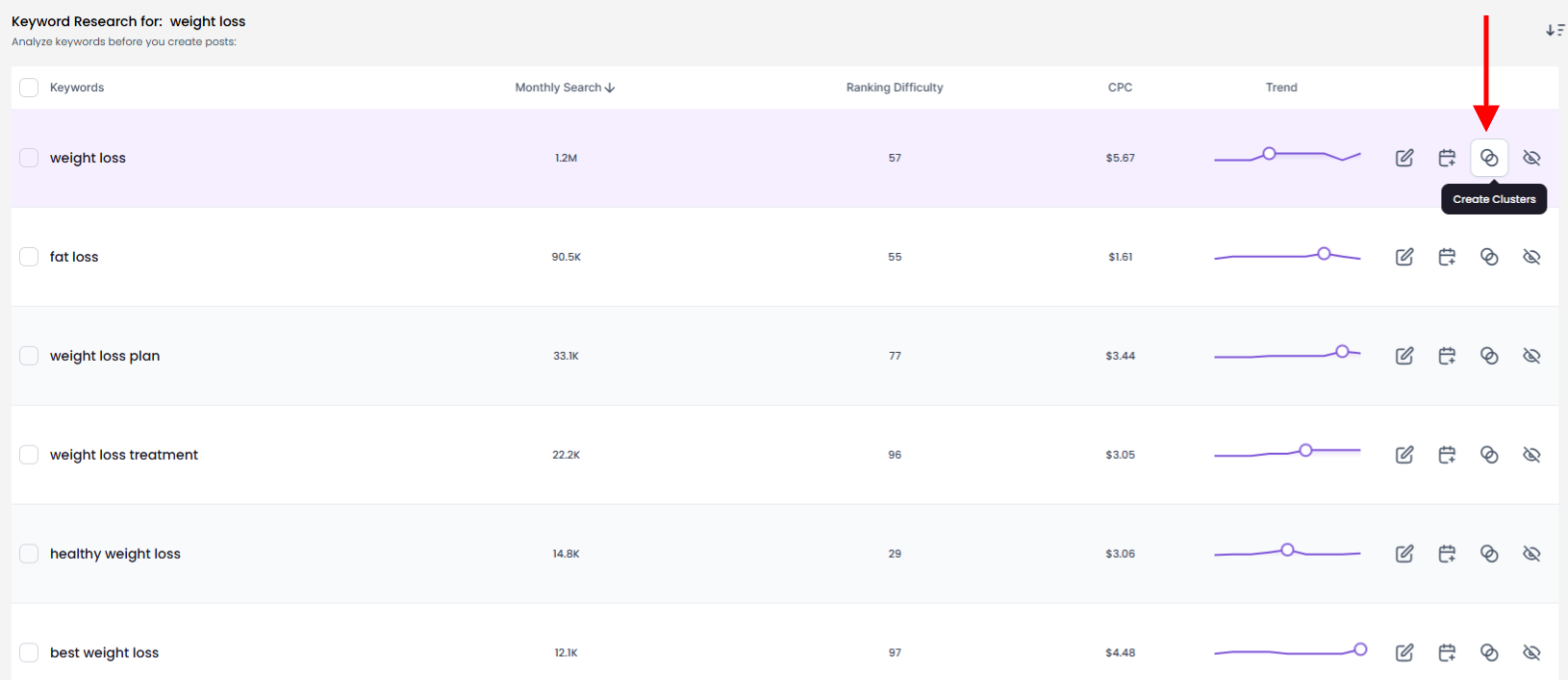
Do this for every keyword you want to build more clusters around.
3️⃣Once you have enough keywords, click the “Write Now” button to prompt the AI to generate your article.
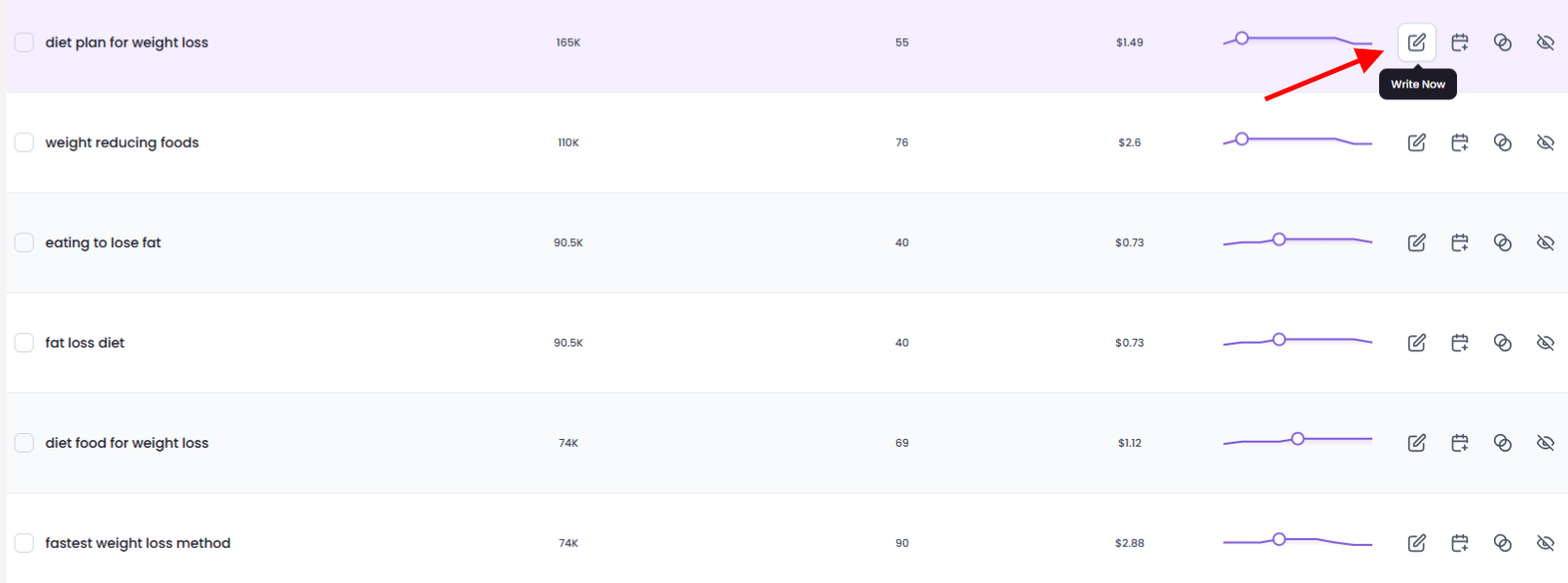
Wait a few minutes and you’ll have a draft of a full-length, SEO-friendly blog post that you can refine before publishing.
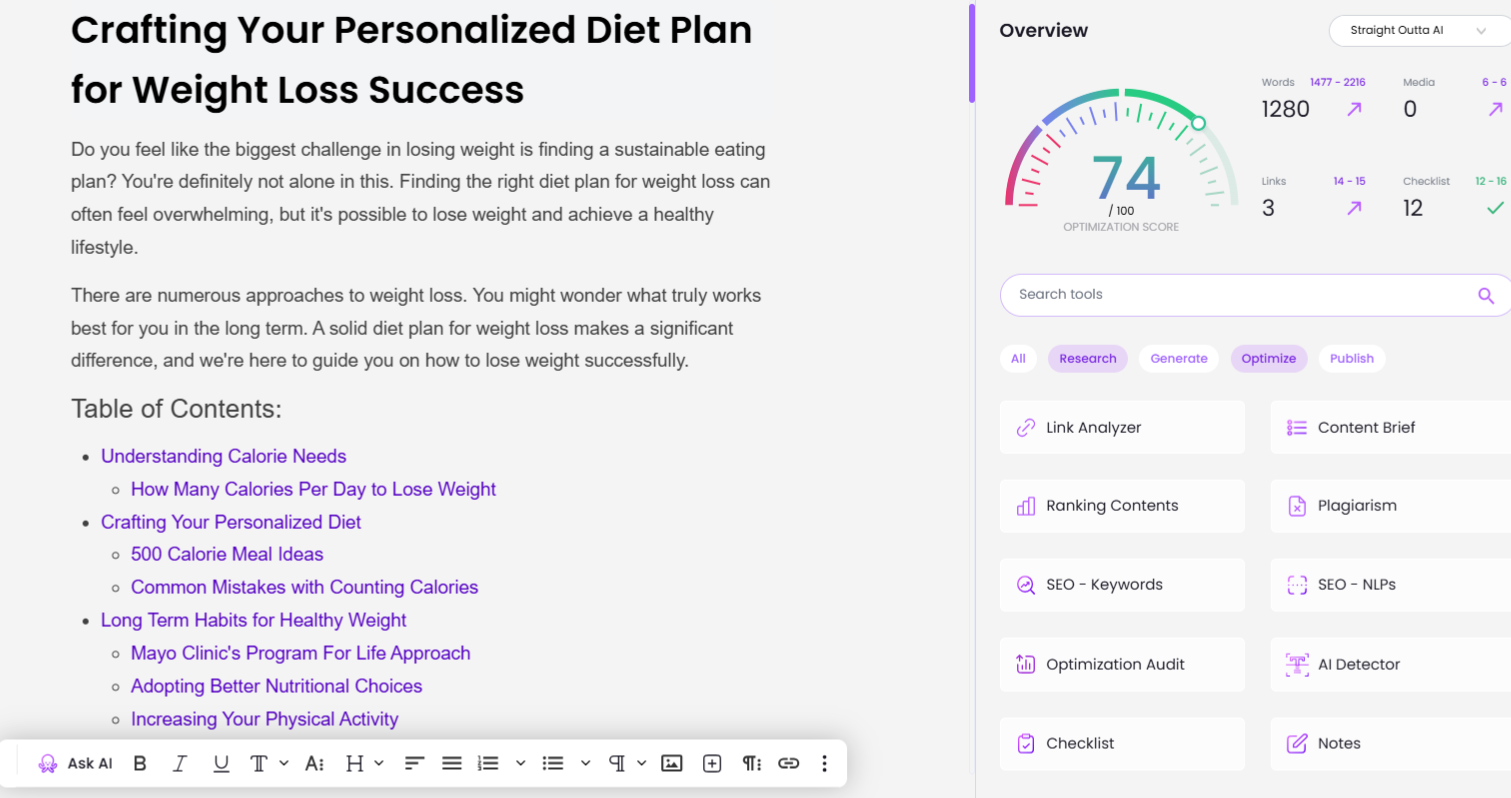
Unlike generic AI tools that require multiple setup steps, BrandWell can generate a full draft starting from just a single keyword input.
Now let’s analyze RankWell’s output. Notice that in this draft, the SEO score is 74 straight out of AI — decent, but not top-notch. To make this go into the higher 90s, you need to tweak your draft a little bit.
How to Turn AI-Generated Text Into Authoritative Content
First, optimize content for Google E-E-A-T.
Your blog post needs more than just AI-generated text. It needs experience, expertise, authoritativeness, and trustworthiness.
Let me show you how to add EEAT to your RankWell draft:
Inject First-Hand Experience
AI-generated content often lacks real-world insights, so it’s essential to add personal experience, case studies, or real-life examples to make it more authentic.
- Add personal anecdotes, experiments, or real-world results (e.g., “I tested this strategy for 3 months and saw a 20% weight loss.”)
- Use case studies or testimonials (e.g., “John used this method and lost 20 lbs in 2 months.”)
- Include before-and-after scenarios (e.g., “Before implementing this, my body fat was 5%, now it’s 2%. Here’s what I did.”)
If AI generates an article on weight loss, supplement it with a real testimonial or transformation story from someone who followed a proven strategy.
Demonstrate Subject Matter Expertise
Google values content written by credible experts, so AI-generated text should be backed by expert contributions or verified sources.
- Add author bios with credentials (e.g., “Dr. Jane Smith, Certified Nutritionist”)
- Cite reputable sources like research papers, industry reports, or government websites
- Include expert interviews or quotes from professionals in the field
For example: Instead of AI vaguely stating “Intermittent fasting helps with weight loss,” reinforce it with scientific backing like “A 2024 study published in the New England Journal of Medicine found that intermittent fasting can reduce body fat by up to 8% over 12 weeks.”
Build Authoritativeness with Strong References
Authority comes from trust signals, citations, and comprehensive content that makes your site a go-to resource in your niche.
- Reference peer-reviewed studies, medical journals, or official publications
- Link to high-authority websites like Harvard, Mayo Clinic, or CDC
- Build internal links to other well-researched articles on your site
- Cover topics in-depth (don’t just touch on the basics — explain why, how, and what next?)
Establish Trustworthiness with Transparency
Trust comes from accurate, transparent, and well-structured content that users can verify.
- Fact-check AI-generated content to ensure accuracy
- Use trust signals (secure website, real author profiles, contact info, privacy policy)
- Disclose content sources and clearly state if AI was used in writing
- Avoid clickbait, misleading claims, or exaggerated results
For example: If AI writes “This diet will help you lose 10 pounds in a week!” — tone it down with realistic and science-backed claims instead of hype.
AI can speed up content creation, but human oversight is essential to meet Google’s EEAT guidelines. By injecting real-world experience, citing expert sources, and ensuring factual accuracy, you can position your site as a trusted, authoritative resource in your niche — even if your content was written by a robot.
Another way to boost your SEO score is to add visual elements and internal links to your AI draft.
RankWell automatically creates links between your blog post and relevant articles within your website. But for images, you’ll have to insert them manually.
To do this, click the Generate button on the SEO panel and choose Media:
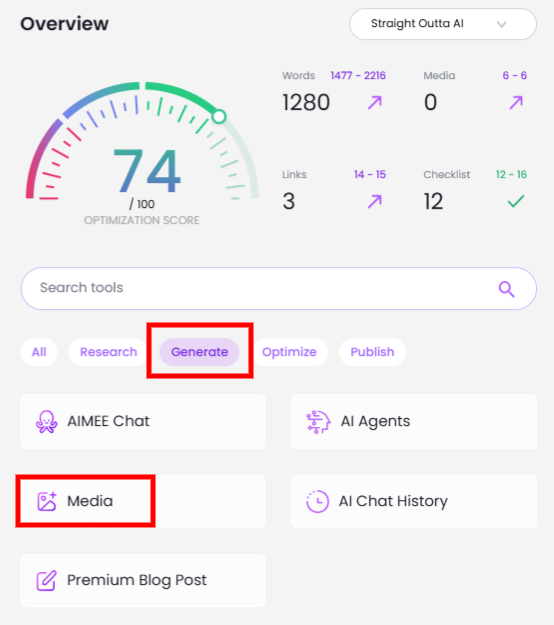
You can choose from free stock photos or upload your own images to your blog post.

After adding a few images and links in strategic places, our SEO score has gone up to 86!
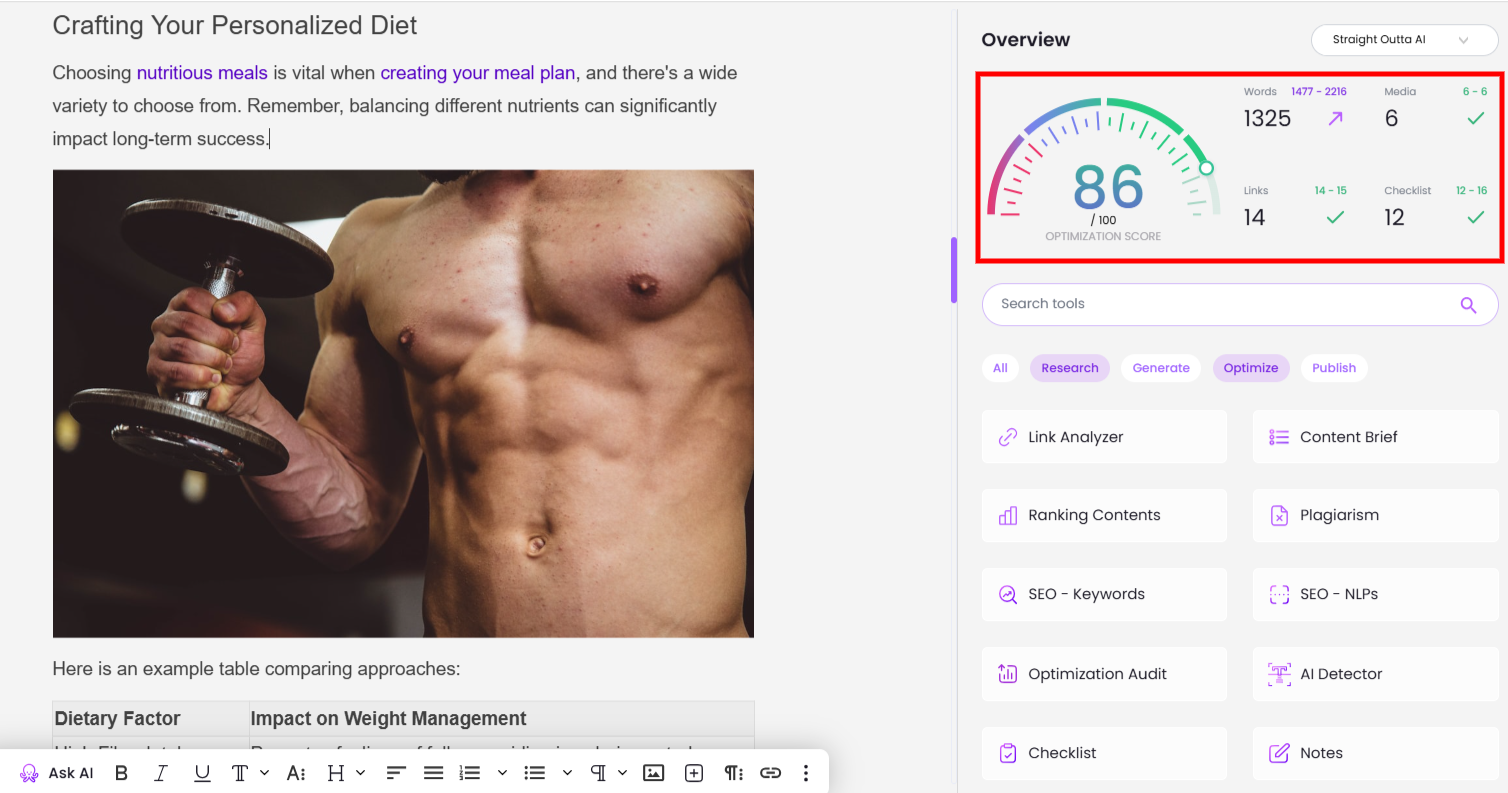
This is already good to publish, but if you want to further improve your article, click the Optimization Audit button to run a real-time content audit and get a report like this:
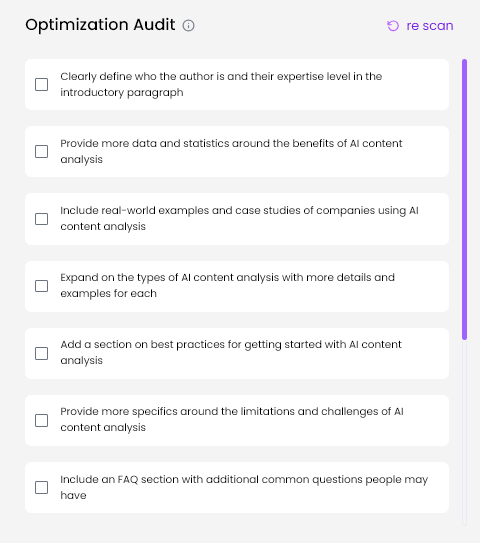
Further Reading: How to Complete a Topical Map in 6 Easy Steps
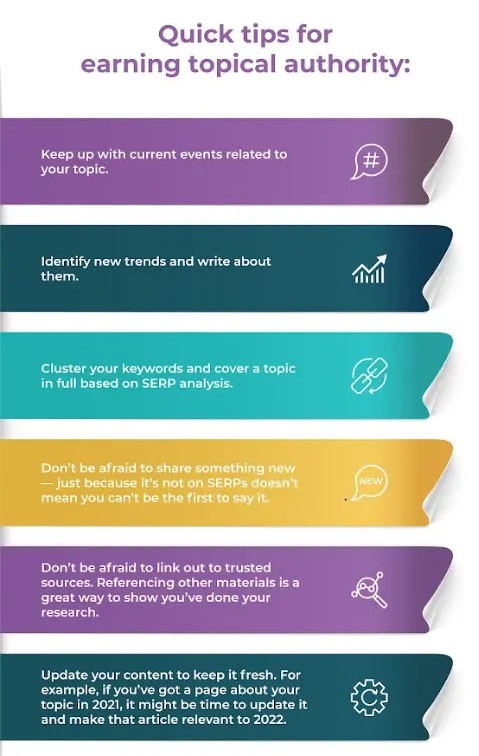
Build Your Topical Authority Faster
Building topical authority isn’t an overnight success — it’s a long-term strategy that requires consistent content creation, strategic linking, and audience engagement.
The more comprehensive and valuable your content is, the more search engines will recognize your site as a trusted industry leader.
But let’s be honest — creating high-quality, in-depth content at scale takes time and effort. Doing it manually could take months or even years.
That’s where BrandWell changes the game.
With BrandWell’s AI-powered long-form writer, you can:
✔️Generate full-length, optimized blog posts instantly
✔️Build complete content clusters effortlessly
✔️Automate internal linking to strengthen your site structure
✔️Scale your content creation without sacrificing quality
The key to establishing topical authority is to cover your niche comprehensively and consistently. With BrandWell, you can streamline the process and strengthen your chances of improving rankings while positioning your site as a trusted resource.
🚀 Start building your topical authority today with BrandWell!

